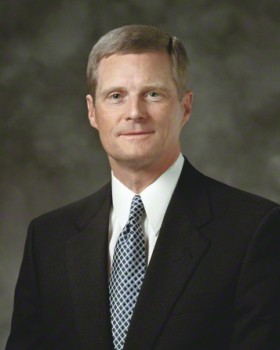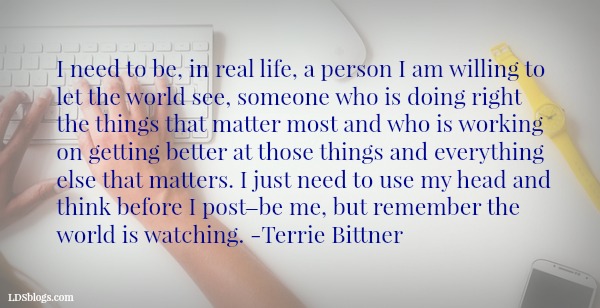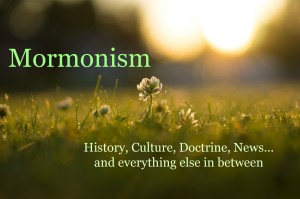I was sitting in my living room packing books for our upcoming move as I listened to Elder Bednar’s BYU devotional address on social media. When he started to talk about Sister Bonnie Oscarson, I stopped to give him my full attention, since she is one of my very favorite Church leaders, as you may have noticed from this blog. Suddenly I heard him say, “Sister Oscarson’s previous pins provided ample evidence of her integrity, prompting one blogger to ask, “Would your Pinterest page pass the Bonnie Oscarson test? … Who will people decide you are if all they know is what is on your social media page?”
 That was me! I was that blogger he was quoting! I went through a rapid series of reactions–shock, excitement, posting it to Facebook, and then…
That was me! I was that blogger he was quoting! I went through a rapid series of reactions–shock, excitement, posting it to Facebook, and then…
Wait–did he actually read my article? (It was quoted in Deseret News, so he might have seen it there.) If he did, did I say anything embarrassing in it? What if he read it on the actual website and then looked around the site to make sure it was reasonable before he gave it attention? (I promptly hoped that if that was the case, he had a staff member do it.) What day would he have seen it? Was there anything embarrassing on it that day I later deleted because I came to my senses?
Now, if you read the article he was quoting, Would Your Pinterest Page Pass the Bonnie Oscarson Test?, then you know that reaction was sort of the point of the article.
Now, here’s your homework: Wander around your social media sites and imagine you’ve just been called as the president of one of the Church auxiliaries. Before you’re called, the prophet is going to do a social media review on you. (I don’t really know if they do that, but just imagine.) You realize the prophet will know what is on all your sites. In a few weeks, the whole world will be rushing in to see as well.
Do you find yourself wanting to erase a few things?
Who will people decide you are if all they know is what is on your social media page and that short little bio that gets released?
 So, it was funny that I was now experiencing something of what I wrote–the possibility that an apostle of the Lord was reading what I wrote and being nervous about it. Eventually, I did laugh about my reaction.
So, it was funny that I was now experiencing something of what I wrote–the possibility that an apostle of the Lord was reading what I wrote and being nervous about it. Eventually, I did laugh about my reaction.
Although I’ve taught this principle for many years, I never really believed an apostle or prophet might read my words–and I certainly never thought they’d quote me. I just have a little and unimportant personal website. It’s one thing to suggest pretending…another to have it happen. It taught me a lesson.
We’re always being warned that whatever we put online is there forever and anyone–absolutely anyone–might see it. This week, I learned this is true. At first, it was a little intimidating. I was almost afraid to write anything else. Then I came to senses. I am a good Mormon. I follow the prophet. I try to be the person I teach my Primary students to be. When I write about the gospel, I don’t write things I’m embarrassed about. I don’t attack the Church or its leaders. I’m not perfect, but I’m doing the best I can.
 Elder Bednar asked us to be authentic on our blogs. I was blogging long before the word was invented, and I also had websites. My first website was about homeschooling. I was not authentic. Homeschooling was still rare and cautiously legal. Most of us had Child Protective Services called on us periodically because our children didn’t go to school. We were afraid to be honest about our experiences. In case a judge researched us, we wanted to look perfect.
Elder Bednar asked us to be authentic on our blogs. I was blogging long before the word was invented, and I also had websites. My first website was about homeschooling. I was not authentic. Homeschooling was still rare and cautiously legal. Most of us had Child Protective Services called on us periodically because our children didn’t go to school. We were afraid to be honest about our experiences. In case a judge researched us, we wanted to look perfect.
A woman emailed me and begged me to be authentic, to tell the truth about homeschooling–that it was wonderful, but that no one is perfect. She suggested it would help others if we were truthful about our experiences, good and bad. I was nervous, but I gave it a try and it worked–and it led to a book contract that was also honest about my weaknesses as a homeschooler. People said it helped.
So, in writing about the gospel, I try to be authentic. I try to admit I am not perfect, but I’m trying. I don’t have a trial-free life, but I’m approaching those trials with faith and, when possible, with humor. I don’t have to be embarrassed to let anyone–not even an apostle, a prophet, or God–see what I wrote or who I am. I need to be, in real life, a person I am willing to let the world see, someone who is doing right the things that matter most and who is working on getting better at those things and everything else that matters. I just need to use my head and think before I post–be me, but remember the world is watching.
And now that my two seconds of fame are over, I am going to finish packing those books. Really…I am.
About Terrie Lynn Bittner
The late Terrie Lynn Bittner—beloved wife, mother, grandmother, and friend—was the author of two homeschooling books and numerous articles, including several that appeared in Latter-day Saint magazines. She became a member of the Church at the age of 17 and began sharing her faith online in 1992.



